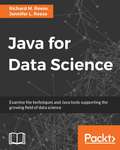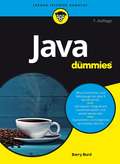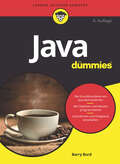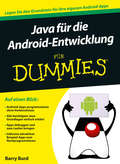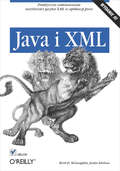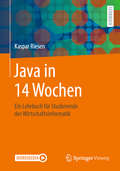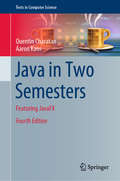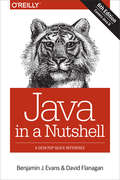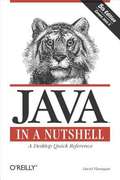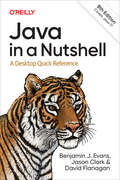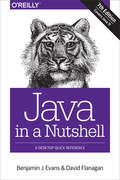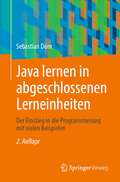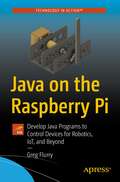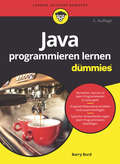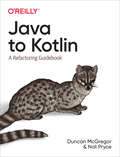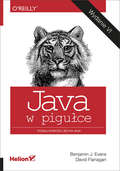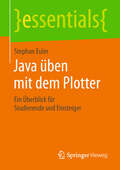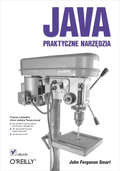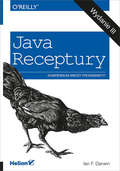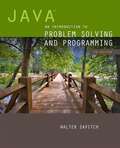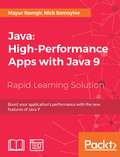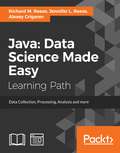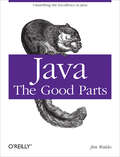- Table View
- List View
Java for Data Science
by Richard M. Reese Jennifer L. ReeseExamine the techniques and Java tools supporting the growing field of data science About This Book • Your entry ticket to the world of data science with the stability and power of Java • Explore, analyse, and visualize your data effectively using easy-to-follow examples • Make your Java applications more capable using machine learning Who This Book Is For This book is for Java developers who are comfortable developing applications in Java. Those who now want to enter the world of data science or wish to build intelligent applications will find this book ideal. Aspiring data scientists will also find this book very helpful. What You Will Learn • Understand the nature and key concepts used in the field of data science • Grasp how data is collected, cleaned, and processed • Become comfortable with key data analysis techniques • See specialized analysis techniques centered on machine learning • Master the effective visualization of your data • Work with the Java APIs and techniques used to perform data analysis In Detail Data science is concerned with extracting knowledge and insights from a wide variety of data sources to analyse patterns or predict future behaviour. It draws from a wide array of disciplines including statistics, computer science, mathematics, machine learning, and data mining. In this book, we cover the important data science concepts and how they are supported by Java, as well as the often statistically challenging techniques, to provide you with an understanding of their purpose and application. The book starts with an introduction of data science, followed by the basic data science tasks of data collection, data cleaning, data analysis, and data visualization. This is followed by a discussion of statistical techniques and more advanced topics including machine learning, neural networks, and deep learning. The next section examines the major categories of data analysis including text, visual, and audio data, followed by a discussion of resources that support parallel implementation. The final chapter illustrates an in-depth data science problem and provides a comprehensive, Java-based solution. Due to the nature of the topic, simple examples of techniques are presented early followed by a more detailed treatment later in the book. This permits a more natural introduction to the techniques and concepts presented in the book. Style and approach This book follows a tutorial approach, providing examples of each of the major concepts covered. With a step-by-step instructional style, this book covers various facets of data science and will get you up and running quickly.
Java für Dummies (FÜr Dummies)
by Barry BurdJava für Dummies ist gleichzeitig ein Lehrbuch und ein unverzichtbares Nachschlagewerk für alle Java-Programmierer. Basiswissen zur objektorientierten Programmierung wird genauso vermittelt wie das Prinzip der Wiederverwendbarkeit von Programmbausteinen und allgemeine Grundlagen der Java-Programmierung.
Java für Dummies (Für Dummies)
by Barry BurdSie wollen in Java einsteigen oder Ihre Kenntnisse erweitern? »Java für Dummies« ist gleichzeitig Lehrbuch und unverzichtbares Nachschlagewerk für alle Java-Programmierer. Basiswissen zur objektorientierten Programmierung wird genauso vermittelt wie das Prinzip der Wiederverwendbarkeit von Programmbausteinen. Außerdem lernen Sie, wann Variablen innerhalb oder außerhalb von Methoden deklariert werden sollten, wo die Grenzen von Arrays liegen und wie Code mit Exceptions absturzsicher gemacht wird. Diese Auflage von »Java für Dummies« berücksichtigt die Neuerungen der Version Java 17.
Java für die Android-Entwicklung für Dummies (Für Dummies)
by Barry BurdAlle Java-Grundlagen für die App-Entwicklung Sie möchten eigene Android-Apps entwickeln, können aber noch nicht programmieren oder zumindest noch kein Java? Dann ist dieses Buch wie für Sie gemacht. Nach der Installation der kostenlosen Entwicklungswerkzeuge lernen Sie Schritt für Schritt alle wichtigen Code-Elemente wie Variablen, Methoden und Schleifen sowie die objektorientierte Programmierung kennen. Außerdem erfahren Sie, wie Android-Apps aufgebaut sind, wie Sie sie mit Buttons, Auswahllisten und Layouts ausstatten und die Programmlogik mit Java erstellen. Anhand eines Spiels und einer Twitter-App sehen Sie, wie alles zusammenhängt. So steht Ihren eigenen Apps nichts mehr im Weg!
Java i XML. Wydanie III
by Brett Mclaughlin Justin EdelsonPraktyczne zastosowania mo?liwo?ci j?zyka XML w aplikacji Java Z jakich elementów sk?ada si? XML? W jaki sposób przetwarza? pliki XML w aplikacjach Javy? Jak tworzy? w?asne kana?y RSS? Jeste? programist? Javy i chcesz wykorzysta? w swoich aplikacjach technologi? XML? Zainteresowa?a Ci? technologia AJAX? Zamierzasz tworzy? w?asne kana?y RSS i podcasty? Java i XML s? niemal stworzone do wzajemnej wspó?pracy. W XML tworzy si? pliki konfiguracyjne dla aplikacji Javy, zbiory danych i wiele innych elementów. AJAX, bazuj?cy w du?ej mierze na j?zyku XML, pozwala na stworzenie eleganckich i wygodnych interfejsów u?ytkownika dla aplikacji przegl?darkowych. Wiedza o tym, jak efektywnie po??czy? XML z Jav?, pomo?e Ci w budowaniu nowoczesnych programów. "Java i XML. Wydanie III" to podr?cznik, po przeczytaniu którego staniesz si? ekspertem w zakresie wykorzystywania mo?liwo?ci j?zyka XML. Czytaj?c go, poznasz podstawy j?zyka XML, sposoby przetwarzania plików XML w aplikacjach Javy za pomoc? API SAX, DOM, StAX, JDOM i dom4j, a tak?e najnowszych wersji JAXP i JAXB. Dowiesz si?, jak tworzy? kana?y RSS, witryny Web 2.0 i w?asne podcasty. Przeczytasz tak?e o technologii AJAX i nauczysz si? budowa? z jej wykorzystaniem interfejsy u?ytkownika dla swoich aplikacji. Elementy j?zyka XML Walidacja dokumentów XML Przetwarzanie plików XML za pomoc? SAX Wykorzystanie innych technologii do obróbki plików XML Wi?zanie danych w JAXB Tworzenie kana?ów RSS Transformacja XML na HTML za pomoc? JSP Korzystanie z mechanizmów AJAX Wykorzystanie danych XML w j?zyku ActionScript 3.0 Twórz nowoczesne aplikacje, wykorzystuj?c XML
Java in 14 Wochen: Ein Lehrbuch für Studierende der Wirtschaftsinformatik
by Kaspar RiesenDieses Buch ist der ideale Begleiter, wenn Sie in einem Semester Java lernen möchten. Der Inhalt wurde gezielt ausgewählt, so dass nur die Konzepte besprochen werden, die Sie zum Einstieg in die Programmierung wirklich benötigen. Diese Konzepte werden mit zahlreichen, anschaulichen Beispielen illustriert. Weiter wird im Buch ein durchgehendes Beispielprojekt in Java, das von Kapitel zu Kapitel wächst, entwickelt. Zu jedem Kapitel finden sich zudem viele Aufgaben zur Selbstkontrolle und Programmierübungen in Java. Zu jeder Übung ist ein Lernvideo verlinkt, auf dem der Autor des Buches die Übung vorprogrammiert. Das Buch ist somit optimal geeignet für Studierende der Wirtschaftsinformatik, Informatik oder anderer Fachrichtungen sowie für alle Interessierten, die ohne Vorkenntnisse Programmieren lernen möchten.
Java in Two Semesters: Featuring JavaFX (Texts in Computer Science )
by Quentin Charatan Aaron KansThis easy-to-follow textbook teaches Java programming from first principles, as well as covering design and testing methodologies. The text is divided into two parts. Each part supports a one-semester module, the first part addressing fundamental programming concepts, and the second part building on this foundation, teaching the skills required to develop more advanced applications. <P><P> This fully updated and greatly enhanced fourth edition covers the key developments introduced in Java 8, including material on JavaFX, lambda expressions and the Stream API. <P><P> Topics and features: begins by introducing fundamental programming concepts such as declaration of variables, control structures, methods and arrays; goes on to cover the fundamental object-oriented concepts of classes and objects, inheritance and polymorphism; uses JavaFX throughout for constructing event-driven graphical interfaces; includes advanced topics such as interfaces and lambda expressions, generics, collection classes and exceptions; explains file-handling techniques, packages, multi-threaded programs, socket programming, remote database access and processing collections using streams; includes self-test questions and programming exercises at the end of each chapter, as well as two illuminating case studies; provides additional resources at its associated website (simply go to springer.com and search for "Java in Two Semesters"), including a guide on how to install and use the NetBeans™ Java IDE. Offering a gentle introduction to the field, assuming no prior knowledge of the subject, Java in Two Semesters is the ideal companion to undergraduate modules in software development or programming.
Java in a Nutshell
by David Flanagan Benjamin J EvansThe latest edition of Java in a Nutshell is designed to help experienced Java programmers get the most out of Java 7 and 8, but it's also a learning path for new developers. Chock full of examples that demonstrate how to take complete advantage of modern Java APIs and development best practices, the first section of this thoroughly updated book provides a fast-paced, no-fluff introduction to the Java programming language and the core runtime aspects of the Java platform.The second section is a reference to core concepts and APIs that shows you how to perform real programming work in the Java environment.Get up to speed on language details, including Java 8 changesLearn object-oriented programming, using basic Java syntaxExplore generics, enumerations, annotations, and lambda expressionsUnderstand basic techniques used in object-oriented designExamine concurrency and memory, and how they're intertwinedWork with Java collections and handle common data formatsDelve into Java's latest I/O APIs, including asynchronous channelsUse Nashorn to execute JavaScript on the Java Virtual MachineBecome familiar with development tools in OpenJDK
Java in a Nutshell, 5th Edition
by David FlanaganThe 1.4 release of Java 2 Standard edition brings a load of new features - and the potential for frustration. Fret not, our new 4th edition has answers. The accelerated introduction lets you start writing code right away, and because the book's classic quick reference contains all the classes in the essential Java packages, you can find exactly what you need to make Java's new version work for you.
Java in a Nutshell: A Desktop Quick Reference
by David Flanagan Benjamin J Evans Jason ClarkThis updated edition of the Nutshell guide not only helps experienced Java programmers get the most out of versions through Java 17, it also serves as a learning path for new developers. Chock-full of examples that demonstrate how to take complete advantage of modern Java APIs and development best practices, this thoroughly revised book includes new material on recent enhancements to the Java object model that every developer should know about.The first section provides a fast-paced, no-fluff introduction to the Java programming language and the core runtime aspects of the Java platform. The second section is a reference to core concepts and APIs that explains how to perform real programming work in the Java environment.Get up to speed on language details through Java 17Learn object-oriented programming using basic Java syntaxExplore generics, enumerations, annotations, and lambda expressionsUnderstand techniques used in object-oriented designExamine how concurrency and memory are intertwinedWork with Java collections and handle common data formatsDelve into Java's latest I/O APIs including asynchronous channelsBecome familiar with development tools in OpenJDK
Java in a Nutshell: A Desktop Quick Reference (Seventh Edition) (In a Nutshell)
by David Flanagan Ben Evans<p>This updated edition of Java in a Nutshell not only helps experienced Java programmers get the most out of Java versions 9 through 11, it’s also a learning path for new developers. Chock full of examples that demonstrate how to take complete advantage of modern Java APIs and development best practices, this thoroughly revised book includes new material on Java Concurrency Utilities. <p>The book’s first section provides a fast-paced, no-fluff introduction to the Java programming language and the core runtime aspects of the Java platform. The second section is a reference to core concepts and APIs that explains how to perform real programming work in the Java environment. <p>Get up to speed on language details, including Java 9-11 changes; Learn object-oriented programming, using basic Java syntax; Explore generics, enumerations, annotations, and lambda expressions; Understand basic techniques used in object-oriented design; Examine concurrency and memory, and how they’re intertwined; Work with Java collections and handle common data formats; Delve into Java’s latest I/O APIs, including asynchronous channels; Use Nashorn to execute JavaScript on the Java Virtual Machine; Become familiar with development tools in OpenJDK.</p>
Java lernen in abgeschlossenen Lerneinheiten: Der Einstieg in die Programmierung mit vielen Beispielen
by Sebastian DörnDieses Lehrbuch bringt Einsteiger anhand einzelner abgeschlossener Lerneinheiten das Programmieren mit Java bei. Es zeigt den Entwurf von effizienten Daten- und Ablaufstrukturen und versetzt die Leser dadurch in die Lage, algorithmische Konzepte zu verstehen und in Programmcode umzusetzen.Zentrale Lernziele sind das Verstehen der Abstraktionskonzepte moderner Programmiersprachen und das Erlernen des logischen und algorithmischen Denkens: Das Buch behandelt die strukturelle Programmierung, die Funktionsweise von Algorithmen, die Grundprinzipien der Objektorientierung und das Verarbeiten von Dateien. Die erweiterte neue Auflage umfasst auch die Bereiche Modultests, Vererbung, abstrakte Klassen, Interfaces und objektorientierte Entwurfsmuster.Zahlreiche Programmierbeispiele machen die einzelnen Konzepte begreifbar und leicht nachvollziehbar.Das Lehrbuch richtet sich an Studierende, Schüler, Lehrkräfte und an alle, die einen schnellen Einstieg in die Programmierung mit Java suchen.
Java on the Raspberry Pi: Develop Java Programs to Control Devices for Robotics, IoT, and Beyond
by Greg FlurryUse Java to do whatever you want to do with the Raspberry Pi and the devices you need for your project. In theory, it should be possible, and even easy, to work with on the Pi. Unfortunately, reality is a bit different. This book features an extensive set of techniques that allow you to get close to bringing this theory to fruition.You'll review some limitations on using Java imposed by the Raspberry Pi and Raspberry Pi OS, and even Java itself, and examine which ones might apply to your projects and your devices. You'll also explore solutions to address the limitations and l look at efficient development of Java for the Raspberry Pi. Java on the Raspberry Pi shows how to interact with a range of devices useful in robotics and IOT, overcoming the hurdles in doing so. It also covers off-loading work from the Raspberry Pi to an Arduino, leveraging its close-to-real time capabilities. What You'll Learn Develop with Java remotely using NetBeans Leverage available libraries to enable device interaction, and what to do if they don’t work Implement multi-processing, using an Arduino as a co-processorBuild sophisticated projects with multiple threads of execution, multiple processes, and even multiple systems Who This Book Is ForExperienced programmers who appreciate the benefits of Java and world class tools for application development and want to build robotics or IOT projects using the low cost, low power, and portability of the Raspberry Pi.
Java programmieren lernen für Dummies (Für Dummies)
by Barry BurdSteigen Sie mit diesem Buch in die Welt des Programmierens ein und zwar mit der beliebten Programmiersprache Java! Schritt für Schritt werden Sie mit den Grundlagen, wie zum Beispiel Variablen, Schleifen und objektorientierter Programmierung, vertraut gemacht, probieren viele anschauliche Beispiele aus und schreiben Ihr erstes eigenes Programm. Dieses Buch steht Ihnen bei allen Herausforderungen jederzeit mit hilfreichen Tipps und Lösungsvorschlägen zur Seite, sodass Sie auf Ihrem Weg zum Programmierer optimal gerüstet sind! Mit den Programmbeispielen zum Herunterladen können Sie das Gelernte direkt ausprobieren.
Java to Kotlin: A Refactoring Guidebook
by Duncan McGregor Nat PryceIt takes a week to travel the 8,000 miles overland from Java to Kotlin. If you're an experienced Java developer who has tried the Kotlin language, you were probably productive in about the same time.You'll have found that they do things differently in Kotlin, though. Nullability is important, collections are different, and classes are final by default. Kotlin is more functional, but what does that mean, and how should it change the way that you program? And what about all that Java code that you still have to support?Your tour guides Duncan and Nat first made the trip in 2015, and they've since helped many teams and individuals follow in their footsteps. Travel with them as they break the route down into legs like Optional to Nullable, Beans to Values, and Open to Sealed Classes. Each explains a key concept and then shows how to refactor production Java to idiomatic Kotlin, gradually and safely, while maintaining interoperability.The resulting code is simpler, more expressive, and easier to change. By the end of the journey, you'll be confident in refactoring Java to Kotlin, writing Kotlin from scratch, and managing a mixed language codebase as it evolves over time.
Java w pigu?ce. Wydanie VI
by David Flanagan Benjamin J EvansPoznaj nowo?ci j?zyka Java!Java to j?zyk programowania wybierany wsz?dzie tam, gdzie s? wymagane najwy?sze bezpiecze?stwo i wydajno??. Znajduje zastosowanie przy tworzeniu systemów bankowych oraz zaawansowanych aplikacji do zarz?dzania przedsi?biorstwami. S? to obszary, w których pomy?ki bywaj? niezwykle drogie. Ale to nie jedyne zastosowania Javy! Ten j?zyk sprawdza si? równie? wtedy, gdy trzeba szybko stworzy? aplikacj? internetow? (niezale?nie od jej wielko?ci) albo narz?dzia ró?nego przeznaczenia. Java przyda si? wsz?dzie!W ostatnim czasie na rynku pojawi?y si? dwie kolejne wersje tego j?zyka, oznaczone numerami 7 i 8. Zawieraj? one wiele nowo?ci i ulepsze?, dzi?ki którym ?ycie programisty staje si? prostsze, a tworzone oprogramowanie — lepsze. Najnowsze wydanie tej cenionej ksi??ki zosta?o uzupe?nione o informacje na temat tych w?a?nie wersji. Dzi?ki niej b?yskawicznie poznasz i wykorzystasz nowe techniki w codziennej pracy. Si?gnij po ten podr?cznik i poznaj najlepsze techniki programowania wspó?bie?nego, zasady podej?cia obiektowego oraz mo?liwo?ci asynchronicznego wykonywania operacji wej?cia-wyj?cia. Ta ksi??ka jest obowi?zkow? lektur? dla wszystkich programistów j?zyka Java! Poznasz szczegó?owo j?zyk programowania Java i dowiesz si?, jakie zmiany wprowadzono w Javie 8. Nauczysz si? programowania obiektowego przy u?yciu podstawowej sk?adni Javy. Poznasz typy ogólne, wyliczenia, adnotacje i wyra?enia lambda. Nauczysz si? podstawowych technik projektowania obiektowego. Poznasz techniki wspó?bie?no?ci i ich ?cis?y zwi?zek z modelem pami?ci. Nauczysz si? u?ywa? kolekcji Javy i pos?ugiwa? si? typowymi formatami danych. Szczegó?owo zbadasz najnowsze interfejsy API wej?cia i wyj?cia Javy, w??cznie z kana?ami asynchronicznymi. Dowiesz si?, jak wykonywa? kod JavaScript w maszynie wirtualnej Javy za pomoc? Nashorna. Poznasz narz?dzia programistyczne dost?pne w pakiecie OpenJDK.Poznaj najskrytsze tajemnice j?zyka Java!
Java üben mit dem Plotter: Ein Überblick für Studierende und Einsteiger (essentials)
by Stephan EulerDieses essential zeigt, wie man in Java-Anwendungen mit dem Plotter grafische Darstellungen erzeugen kann. Mit dem Plotter-Objekt – angelehnt an den Stiftplotter, der sich mit Steuerbefehlen über Papier bewegt – wird eine einfache Schnittstelle zur grafischen Programmierung angeboten. Bereits beim Einstieg in die Programmierung entstehen so erste grafische Darstellungen wie z.B. Funktionsverläufe und Simulationsergebnisse. Durch einfache Programmierbeispiele und Aufgaben wird der Umgang mit grundlegenden Konzepten wie Variablen, Kontrollstrukturen, Methoden und Klassen geübt.
Java. Praktyczne narzędzia
by John Ferguson SmartPoznaj narzędzia, które okażą się niezbędne! Jak zapewnić wysoką jakość tworzonego rozwiązania?Jak wprowadzić proces ciągłej integracji?Jak testować kod? Możliwości języka Java znają już chyba wszyscy. Dlatego warto jedynie wspomnieć o tym, że oprócz podstawowych narzędzi do tworzenia oprogramowania w tym języku, które zna każdy programista, istnieje wiele innych -- przydatnych i użytecznych -- aplikacji. Potrafią one w niezwykle skuteczny sposób przyśpieszyć oraz ułatwić programowanie w języku Java i sprawić, że będzie to zajęcie jeszcze przyjemniejsze. W żadnej innej książce nie znajdziesz tak szczegółowego omówienia tych narzędzi. Zatem jeśli wykorzystujesz język Java na co dzień, musisz ją mieć! Dzięki tej książce poznasz 33 praktyczne narzędzia, które ułatwią Twoją pracę -- narzędzia, które zwiększą niezawodność Twojego kodu, poprawią wydajność oraz zapewnią bezpieczeństwo Twoim plikom źródłowym. Autor książki omawia kilka grup narzędzi, a wśród nich aplikacje takie, jak Maven, Subversion, JUnit czy też Hudson. Dzięki książce "Java. Praktyczne narzędzia" dowiesz się, jak bardzo na jakość Twojego rozwiązania może wpłynąć proces ciągłej integracji oraz jak ważne są testy jednostkowe czy integracyjne. Ponadto autor książki omawia 29 innych narzędzi, które zwiększają komfort pracy. Otwórz spis treści i spójrz, jak cenne informacje są zawarte w tej książce! Wykorzystanie narzędzi kompilujących (Ant, Maven2)Zastosowanie systemów kontroli wersji (CVS, Subversion)Sposoby oceny jakości kodu (CheckStyle, PMD, FindBugs, Jupiter)Tworzenie wysokiej jakości dokumentacjiPrzygotowanie testów jednostkowych (JUnit, TestNG)Przeprowadzanie testów integracyjnychSystemy raportowania i śledzenia błędów (Bugzilla, Trac)Narzędzia pozwalające na wprowadzenie procesu ciągłej integracji (Continuum, Hudson)Sposoby przeprowadzania testów obciążeniowychProfilowanie i monitorowanie aplikacji za pomocą narzędzi dostępnych w pakiecie JDK oraz Eclipse Zobacz, jak łatwo można wykonać skomplikowane zadania!
Java. Receptury. Wydanie III
by Ian F. DarwinRozwi?zania i przyk?ady dla programistów u?ywaj?cych j?zyka JavaJava to jeden z j?zyków programowania najch?tniej wybieranych do tworzenia zaawansowanych systemów informatycznych. Systemy bankowe, aukcyjne oraz inne zaawansowane programy wspomagaj?ce codzienn? prac? tysi?cy ludzi opieraj? si? na Javie i narz?dziach z ni? zwi?zanych. Je?eli chcesz ?mia?o wkroczy? w ?wiat tego j?zyka, musisz mie? t? ksi??k?!Ksi??ka nale?y do cenionej serii „Receptury”, która przedstawia ró?ne zagadnienia w postaci krótkich przepisów. Nie inaczej jest w tym przypadku. Si?gnij po ni? i zobacz, jak kompilowa?, uruchamia? i testowa? tworzony kod. W kolejnych rozdzia?ach zaznajomisz si? z najlepszymi metodami przetwarzania ci?gów znaków oraz nauczysz si? korzysta? z wyra?e? regularnych i wykonywa? operacje na liczbach. Ponadto zdob?dziesz dog??bn? wiedz? na temat systemu wej?cia-wyj?cia, u?ywania systemu plików, sieci oraz drukarek. Ksi??ka ta jest obowi?zkow? pozycj? na pó?ce ka?dego programisty Javy!Przedstawione receptury obejmuj?: Sposoby kompilacji, uruchamiania i testowania aplikacji. Manipulacj?, porównywanie i zmian? organizacji tekstów. U?ycie wyra?e? regularnych do dopasowywania tekstów i wzorców. Obs?ug? liczt, dat i czasu. Okre?lanie struktury danych przy u?yciu kolekcji, tablicy i innych typów. Techniki programowania obiektowego i funkcyjnego. Operacje na katalogach i systemie plików. Obs?ug? grafiki, d?wi?ku i wideo. Tworzenia aplikacji o graficznym interfejsie u?ytkownika, w tym Java FX i obs?ug? zdarze?. Programowanie sieciowe, zarówno klientów jak i serwerów. Dost?p do baz danych przy u?yciu JPA, Hibernate oraz JDBC. Przetwarzenie danych w formatach JSON oraz XML. Wielow?tkowo?? i wspó?bie?no??.Najlepsze przepisy dla programistów Javy! Ian F. Darwin - swoj? przygod? w binarnym ?wiecie rozpocz?? w 1980 roku od pracy z systemem operacyjnym UNIX. Autor narz?dzia file znanego z systemów Linux oraz BSD. Programista Javy od 1995 roku. Autor darmowych narz?dzi: PassMaker, JpsTrack. Pracownik Learning Tree International — ?wiatowego lidera w zakresie organizacji kursów technicznych.
Java: An Eventful Approach
by Kim B. Bruce Andrea Pohoreckyj Danyluk Thomas P. MurtaghJava, an object-oriented language with many standard libraries, offers both complexities and opportunities. This introductory book makes use of a new approach to understanding programming in Java. Provides an objects-first approach to programming. Introduces object-oriented graphics and writing methods early in the book. Motivates readers to use event-driven programming. Reinforces the importance of understanding several threads. For anyone interested in the programming language of Java.
Java: An Introduction to Problem Solving and Programming (Seventh Edition)
by Walter SavitchAn introduction to programming using the Java computer programming language.
Java: Boost your application’s performance with the new features of Java 9
by Mayur RamgirOptimize the powerful techniques of Java 9 to boost your application's performanceKey Features Tackle all kinds of performance-related issues and streamline your development Dive into the new features of Java 9 Implement highly efficient and reliable codes with the help of new APIs of Java Embedded with assessments that will help you revise the concepts you have learned in this bookBook DescriptionJava 9 which is one of the most popular application development languages. The latest released version Java 9 comes with a host of new features and new APIs with lots of ready to use components to build efficient and scalable applications. Streams, parallel and asynchronous processing, multithreading, JSON support, reactive programming, and microservices comprise the hallmark of modern programming and are now fully integrated into the JDK. This book focuses on providing quick, practical solutions to enhance your application's performance. You will explore the new features, APIs, and various tools added in Java 9 that help to speed up the development process. You will learn about jshell, Ahead-of-Time (AOT) compilation, and the basic threads related topics including sizing and synchronization. You will also explore various strategies for building microservices including container-less, self-contained, and in-container. This book is ideal for developers who would like to build reliable and high-performance applications with Java. This book is embedded with useful assessments that will help you revise the concepts you have learned in this book.What you will learn Familiarize with modular development and its impact on performance Learn various string-related performance improvements, including compact string and modify string concatenation Explore various underlying compiler improvements, such as tiered attribution and Ahead-of-Time (AOT) compilation Learn security manager improvements Understand enhancements in graphics rasterizers Use of command-line tools to speed up application development Learn how to implement multithreading and reactive programming Build microservices in Java 9 Implement APIs to improve application codeWho this book is forThis book is targeted at developers who would like to build reliable and high-performance applications with Java.
Java: Data Science Made Easy
by Richard M. Reese Jennifer L. Reese Alexey GrigorevData collection, processing, analysis, and more About This Book • Your entry ticket to the world of data science with the stability and power of Java • Explore, analyse, and visualize your data effectively using easy-to-follow examples • A highly practical course covering a broad set of topics - from the basics of Machine Learning to Deep Learning and Big Data frameworks. Who This Book Is For This course is meant for Java developers who are comfortable developing applications in Java, and now want to enter the world of data science or wish to build intelligent applications. Aspiring data scientists with some understanding of the Java programming language will also find this book to be very helpful. If you are willing to build efficient data science applications and bring them in the enterprise environment without changing your existing Java stack, this book is for you! What You Will Learn • Understand the key concepts of data science • Explore the data science ecosystem available in Java • Work with the Java APIs and techniques used to perform efficient data analysis • Find out how to approach different machine learning problems with Java • Process unstructured information such as natural language text or images, and create your own searc • Learn how to build deep neural networks with DeepLearning4j • Build data science applications that scale and process large amounts of data • Deploy data science models to production and evaluate their performance In Detail Data science is concerned with extracting knowledge and insights from a wide variety of data sources to analyse patterns or predict future behaviour. It draws from a wide array of disciplines including statistics, computer science, mathematics, machine learning, and data mining. In this course, we cover the basic as well as advanced data science concepts and how they are implemented using the popular Java tools and libraries.The course starts with an introduction of data science, followed by the basic data science tasks of data collection, data cleaning, data analysis, and data visualization. This is followed by a discussion of statistical techniques and more advanced topics including machine learning, neural networks, and deep learning. You will examine the major categories of data analysis including text, visual, and audio data, followed by a discussion of resources that support parallel implementation. Throughout this course, the chapters will illustrate a challenging data science problem, and then go on to present a comprehensive, Java-based solution to tackle that problem. You will cover a wide range of topics – from classification and regression, to dimensionality reduction and clustering, deep learning and working with Big Data. Finally, you will see the different ways to deploy the model and evaluate it in production settings. By the end of this course, you will be up and running with various facets of data science using Java, in no time at all. This course contains premium content from two of our recently published popular titles: • Java for Data Science • Mastering Java for Data Science Style and approach This course follows a tutorial approach, providing examples of each of the concepts covered. With a step-by-step instructional style, this book covers various facets of data science and will get you up and running quickly.
Java: Der Sprachkurs für Einsteiger und Individualisten (Für Dummies Ser.)
by Arnold V. WillemerJava programmieren lernen auf die etwas andere Art: Wenn Sie sich eine verständliche Einführung wünschen, liegen Sie mit diesem Buch genau richtig, es kann aber noch viel mehr! Witzige Beispiele, knifflige Aufgaben und unzählige schräge Anekdoten von Programmier-Original Arnold Willemer sorgen dafür, dass Sie gar nicht anders können, als Java zu lernen. Von der ersten Schleife über die Datenbank-Entwicklung bis zu Ihrer eigenen Android-App werden Sie alles lernen, was Sie brauchen - und haben auch noch Spaß dabei!
Java: Unearthing the Excellence in Java
by Jim WaldoWhat if you could condense Java down to its very best features and build better applications with that simpler version? In this book, veteran Sun Labs engineer Jim Waldo reveals which parts of Java are most useful, and why those features make Java among the best programming languages available.Every language eventually builds up crud, Java included. The core language has become increasingly large and complex, and the libraries associated with it have grown even more. Learn how to take advantage of Java's best features by working with an example application throughout the book. You may not like some of the features Jim Waldo considers good, but they'll actually help you write better code.Learn how the type system and packages help you build large-scale softwareUse exceptions to make code more reliable and easier to maintainManage memory automatically with garbage collectionDiscover how the JVM provides portability, security, and nearly bug-free codeUse Javadoc to embed documentation within the codeTake advantage of reusable data structures in the collections libraryUse Java RMI to move code and data in a distributed networkLearn how Java concurrency constructs let you exploit multicore processors
